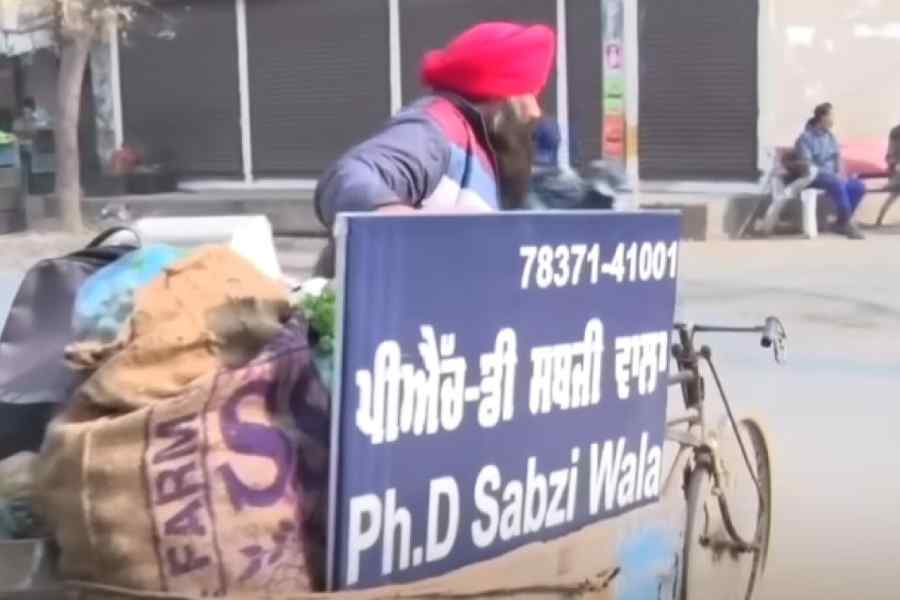Study in resilience
Sir — When life gives one lemons, one should sell them and make some cash. This is the lesson that Sandeep Singh, the 39-year-old with four master’s degrees and a doctorate in law, teaches us. In spite of his erudition, Singh sells vegetables to make ends meet. His story, unfortunately, is like that of many across India — his salary as a contractual professor at a public university in Patiala was paltry and seldom paid on time. He thus gathered his wits and found a way to get a regular income to feed his family by selling vegetables. He rides around on a cart that has a board emblazoned with the words, “Ph.D Sabzi Wala”, and earns enough money not just to support his family but also to pursue yet another degree. Singh truly is a jack of all trades.
Amanpreet Kaur, Chandigarh
Tentative steps
Sir — As the political climate in India begins to heat up ahead of the Lok Sabha elections, the Bharatiya Janata Party-led Centre has proudly proclaimed a ‘historic’ achievement in concluding a peace treaty with a segment of the United Liberation Front of Asom (“Partial peace”, Jan 2). This is a familiar narrative that has yielded little on the ground in the past. Critics have also questioned the politically-expedient timing of the agreement given that the once-feared outfit now stands weakened and splintered. The scepticism is thus justified. The success of this latest agreement can be measured only in the form of tangible improvements in the lives of the people of Assam. Time will tell if this accord will be a catalyst for lasting peace in the Northeast.
Khokan Das, Calcutta
Sir — Peace in the strife-torn Northeast will remain elusive until all insurgent outfits in the region are brought under the rule of law. An agreement with one faction of the Ulfa is not enough. The Centre must bring all the active insurgent organisations to the table and strive for peace. At the same time, it should remain wary of interference from China and Myanmar in the peace process.
Aranya Sanyal, Siliguri
Sir — In the absence of Paresh Baruah at the negotiating table, the recent peace treaty among the governments of Assam and India and a faction of the Ulfa loses its legitimacy. Unless the Baruah-led faction, Ulfa (Independent), can convince militants to bid farewell to violence and join the mainstream, peace in the Northeast will remain elusive. One also hopes that the government will keep its word and faithfully try to implement every promise made in the peace treaty. Further, it should extend an unconditional invitation to Baruah to participate in talks.
A.K. Chakraborty, Guwahati
Sir — The peace accord signed by the pro-talks faction of the Ulfa with the Centre and the state government will provide a fresh impetus to the regional peace process. In the last five years, nine peace and border-related agreements have been signed by different states in the Northeast. More than 9,000 armed cadres have surrendered and the Armed Forces (Special Powers) Act has been lifted from around 85% of Assam’s area. This shows that tangible progress has been made, even though one of the key members of the Ulfa movement, Paresh Baruah, is still at large. The recent accord was perhaps made easier by the delimitation exercise wherein 97 out of 126 seats were reserved for indigenous communities.
Arka Goswami, West Burdwan
Disastrous start
Sir — The new year has begun on a disastrous note for Japan with numerous earthquakes triggering huge waves and prompting authorities to issue tsunami warnings and evacuation advisories (“Series of quakes hits Japan”, Jan 2). Videos on social media have shown people running for cover while buildings and roads shake violently. The earthquakes have destroyed many buildings and led cracks to develop in roads. Unfortunately, Japan is prone to tectonic disasters as it sits on a belt of unstable volcanoes known as the Pacific Ring of Fire.
N. Sadhasiva Reddy, Bengaluru
Sir — Dozens of people have lost their lives and even more have been injured in the sequence of earthquakes which struck Japan recently. To make matters worse, more than 140 aftershocks have heightened the risk of a tsunami, making rescue operations even more difficult. Japan is vulnerable to tectonic activity. It must be acknowledged that the damage has been mitigated owing to the foresight of the authorities in building earthquake-resistant structures.
Jayanta Datta, Hooghly
Sir — New Year’s Day was ruined for the Japanese by successive earthquakes. More than 50 people have died so far and hundreds of houses have been damaged. One hopes that the country can return to normalcy soon.
M.N. Gupta, Hooghly
Maintain decorum
Sir — The Jagannath temple in Puri is a sacred place for Hindus. Complaints by the servitors against worshippers who do not observe proper etiquette while entering the sanctum sanctorum are justified. The temple authorities have thus rightly instituted a voluntary dress code. It is heartening that most devotees have reportedly adhered to the dress code of their own volition.
Shyamal Thakur, East Burdwan
Hardly feasible
Sir — Anjali Chauhan’s article, “All work, no play” (Jan 2), discussing the recent outcry over a 70-hour work week was interesting. Assuming a work-week of six days, such a schedule would amount to almost 12 hours of work per day. This would disrupt the health and personal lives of employees.
Sanjit Ghatak, South 24 Parganas










